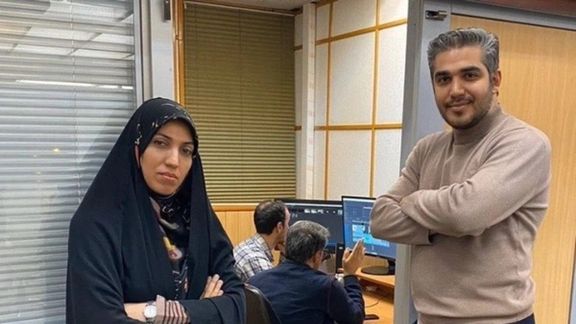Washington Targets Senior Iran Broadcasters Over ‘Free Expression’

In its latest sanctions on Iran, the United States Wednesday designated six leading employees of its state broadcaster, IRIB.
The designation came under Executive Order 13846, made by then President Donald Trump in 2018 after he withdrew the US from the 2015 Iran nuclear agreement. Amid measures targeting Iran’s financial and energy sectors, EO 13846 empowered government departments to sanction entities implicated in “censorship or other activities with respect to Iran on or after June 12, 2009, that prohibit, limit, or penalize the exercise of freedom of expression…or that limit access to print or broadcast media.”
The US first designated IRIB (Islamic Republic of Iran Broadcasting) in 2013, and in 2018 reimposed the move in what then Treasury Secretary Steven Mnuchin said was a part of “the maximum pressure exerted by the United States” after withdrawal from the 2015 nuclear agreement.
The six employees named Wednesday by the US Treasury’s Office of Foreign Assets Control (OFAC) were, its announcement said, involved in “airing forced confessions in the style of documentaries,” had “worked directly with the IRGC [Iran’s Revolutionary Guards] to create false narratives for publication,” or simply had “acted or purported to act for or on behalf of, directly or indirectly, IRIB.”
The announcement said IRIB and its subsidiaries “act not as objective media outlets but rather as a critical tool in the Iranian government’s mass suppression and censorship campaign against its own people.” The statement said IRIB had since 2009, the year of protests over a disputed Iranian presidential election, “broadcast hundreds of forced confessions as well as defamatory content against hundreds more [people].” The Treasury statement took particular umbrage at broadcasts of forced ‘confessions’ of “dual nationals and foreigners.”
‘Interrogator-journalists’
Among the six cited Wednesday, Ali Rezvani and Ameneh Sadat Zabihpour were described as “interrogator-journalists” who had cooperated with Iranian intelligence organizations. Zabihpour, the Treasury statement said, had a “long history of direct involvement in…coerced confessions” including a 2017 broadcast implicating Nazanin Zaghari-Ratcliffe, the British-Iranian woman released in March after the United Kingdom paid a 40-year £400-million debt to Iran.
Peyman Jebelli was named as having “worked directly with the IRGC to create false narratives for publication,” including “many forced confessions of political prisoners.” Mohsen Bormahani, IRIB deputy director, had “replaced a number of directors of IRIB channels, reportedly with members of an ultraconservative political party.” Ahmad Noroozi was listed simply as head of the IRIB World Service, and Yousef Pouranvari as its director of programs and scheduling.
‘Change in behavior’
Under the designations, any property held by the six in the US can be impounded. Any dealings with them by anyone in the US are forbidden, with those ignoring this prohibition themselves liable to punitive action. “The ultimate goal of sanctions is not to punish,” the statement said, “but to bring about a positive change in behavior.”
United States special envoy Rob Malley met Tuesday with European ministers to discuss Iran policy after Malley said Monday there was “no magic in which we will find a new formula.” Malley has recently argued the US had no focus on reviving the 2015 nuclear agreement given Iran’s supply of drone to Russia and treatment of domestic protests. Iran has since 2019, the second year of ‘maximum pressure,’ expanded its nuclear program beyond limits set by the 2015 agreement, the JCPOA (Joint Comprehensive Plan of Action).
Canada, in its fifth package of Iran sanctions this year, also announced new measures Wednesday, designating six individuals allegedly involved in human rights abuses and two companies – Shahed Aviation and Qods Aviation – that Ottawa said have supplied military drones to Russia.